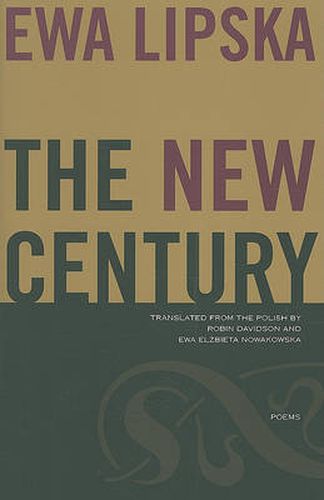Readings Newsletter
Become a Readings Member to make your shopping experience even easier.
Sign in or sign up for free!
You’re not far away from qualifying for FREE standard shipping within Australia
You’ve qualified for FREE standard shipping within Australia
The cart is loading…






Since the publication of her first book in 1967, Ewa Lipska has been among the most acclaimed of contemporary Polish poets. Yet, to date she has not enjoyed the same popularity in the United States as her fellow Poles Wislawa Szymborska, Czeslaw Milosz, and her contemporary Adam Zagajewski.
The New Century: Poems , a selection of her recent work, introduces to an American audience the work of an underappreciated master. Although Lipska’s work displays an acute awareness of history and politics, she’s nonetheless most concerned with individual experience and the most difficult philosophical questions of evil. Lipska is capable of being awed by beauty despite the deep pessimism that flows through her poems, including the failure of language itself to have any ameliorative effect on human experience. Surreal, skeptical, and laced with wit, Lipska’s poetry, like that of Milosz and Szymborska, seems effortlessly to achieve a kind of hardwon and gracefully wielded authority that tells us something essential about the legacies of the twentieth century’s horrors.
$9.00 standard shipping within Australia
FREE standard shipping within Australia for orders over $100.00
Express & International shipping calculated at checkout
Since the publication of her first book in 1967, Ewa Lipska has been among the most acclaimed of contemporary Polish poets. Yet, to date she has not enjoyed the same popularity in the United States as her fellow Poles Wislawa Szymborska, Czeslaw Milosz, and her contemporary Adam Zagajewski.
The New Century: Poems , a selection of her recent work, introduces to an American audience the work of an underappreciated master. Although Lipska’s work displays an acute awareness of history and politics, she’s nonetheless most concerned with individual experience and the most difficult philosophical questions of evil. Lipska is capable of being awed by beauty despite the deep pessimism that flows through her poems, including the failure of language itself to have any ameliorative effect on human experience. Surreal, skeptical, and laced with wit, Lipska’s poetry, like that of Milosz and Szymborska, seems effortlessly to achieve a kind of hardwon and gracefully wielded authority that tells us something essential about the legacies of the twentieth century’s horrors.